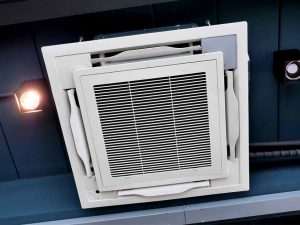HVAC systems are crucial to the success of retail businesses. They are responsible for creating and maintaining a comfortable shopping environment, ensuring the well-being of customers and employees, and preserving the quality of temperature-sensitive products. In this post, we discuss the unique HVAC requirements of retail spaces and ways to address common challenges in these environments.

The Benefits of Effective HVAC Systems in Retail
-
Improved Air Quality: One of the paramount advantages of having an efficient HVAC system is improved air quality within the retail space. This includes the elimination of pollutants, allergens, and unpleasant odors, thereby enhancing the overall shopping experience and safeguarding the health of shoppers and staff.
-
Comfortable Temperatures: Research, including studies conducted by institutions like Cornell University, has consistently highlighted the direct impact of comfortable interiors on consumer behavior. Shoppers are more likely to spend extended time and consequently more money in environments where the temperature is optimally controlled.
-
Energy Efficiency and Reduced Operating Costs: Heating and cooling costs constitute significant operational expenses, particularly in large retail spaces. Energy-efficient HVAC systems can substantially lower these costs while contributing to environmental sustainability.
Key Factors Affecting the HVAC Needs of Retail Spaces
-
Size and Layout of the Premises: The retail space’s architectural design and square footage greatly dictate the type of HVAC system required. Larger spaces like department stores may need more robust systems than smaller boutiques.
-
Customer and Staff Comfort: Retail spaces are high-traffic areas that need to maintain a comfortable temperature to ensure a pleasant shopping environment and productive workspace for the employees.
-
Product Sensitivity to Temperature and Humidity: Certain products, including electronics, perishables, and cosmetics, require controlled environments to prevent spoilage or damage.
Addressing Challenges With Smart HVAC Solutions
-
Zoning for Temperature Variability: Implementing HVAC zoning systems enables retailers to maintain different temperatures in various store parts, such as warmer changing rooms and cooler main shopping areas.
-
Regular Maintenance for Optimal Performance: Frequent and thorough maintenance is crucial to prevent dust accumulation and allergens that could affect air quality and system efficiency.
-
Leveraging Technology for Enhanced Control: The advent of smart controls and HVAC technologies allows retailers to remotely monitor and adjust their systems, ensuring consistently optimal conditions and facilitating energy management.
-
Local Considerations: Retailers must also consider local climate patterns. Hot summers and cold winters necessitate a versatile HVAC system capable of efficient temperature modulation year-round.
Count on Cafco Services to provide you with HVAC solutions that meet your needs and offer long-term energy efficiency and cost savings. Call us at (513) 242-3400 or complete our contact form to schedule an appointment.
